Key takeaways:
- Developing a unique writing voice involves embracing personal quirks and authenticity, moving away from imitation to genuine expression.
- A distinct writing voice enhances connections with readers, making them feel engaged and involved in the narrative.
- Experiences, vulnerability, and feedback are crucial in shaping and refining an individual’s writing voice over time.
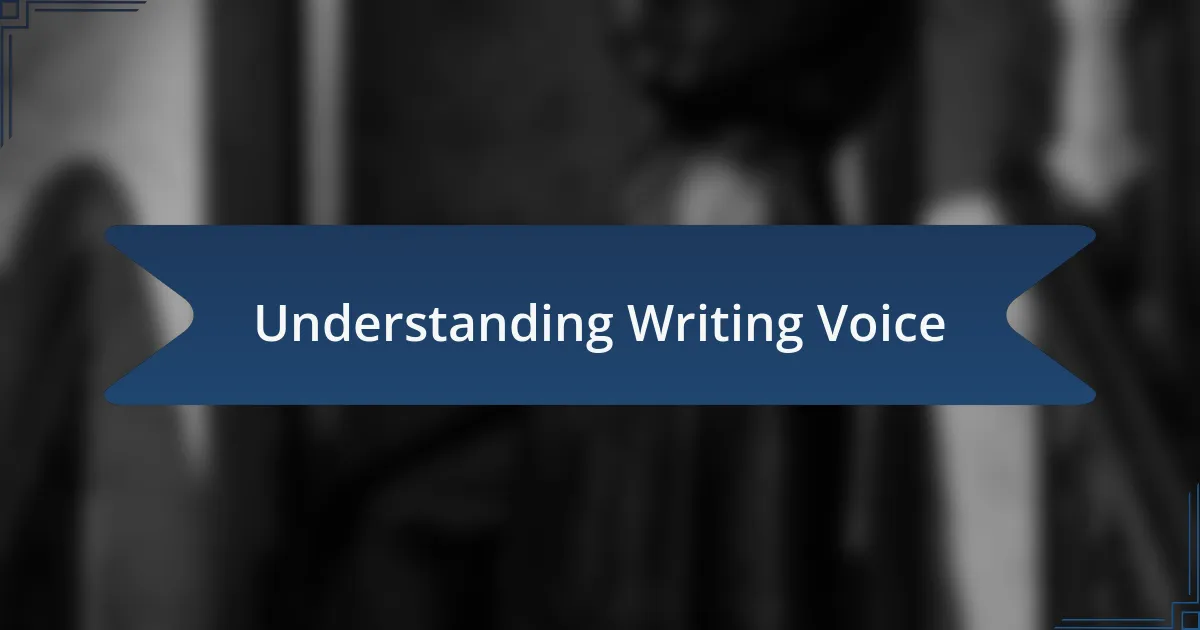
Understanding Writing Voice
Writing voice is like a fingerprint; it’s what makes your words uniquely yours. I remember the first time someone recognized my voice in a piece I wrote. It felt like a rush of affirmation and—let’s be honest—a little bit of euphoria. How can we capture that essence in our work?
When I look back at my early writing, I often see a struggle between mimicry and authenticity. I tried to emulate my favorite authors, believing that I needed to sound exactly like them. It was only after embracing my quirks and imperfections that I discovered my true voice. Have you ever found yourself trapped between imitation and originality? Breaking free from that cycle can be incredibly liberating.
Understanding writing voice requires introspection. It’s about recognizing what resonates with you and your experiences. For instance, I often infuse humor and a touch of sarcasm in my writing, which reflects my personality. That’s where the magic happens—when your unique traits shine through, and readers can see a glimpse of you in every sentence. What parts of your personality are you bringing to the page?
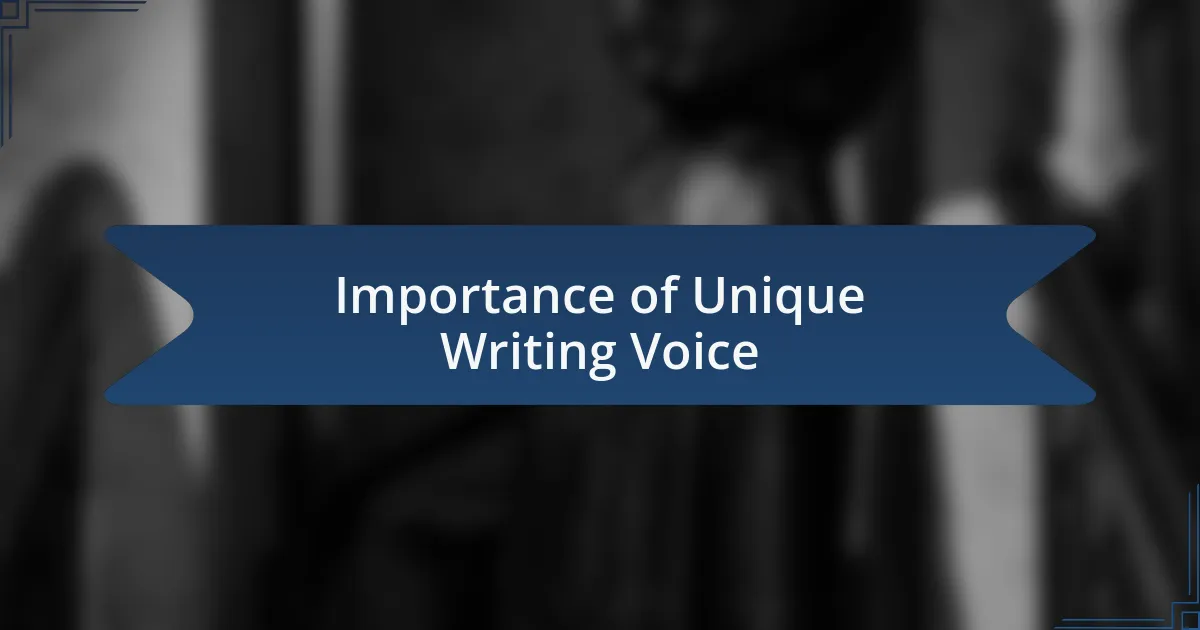
Importance of Unique Writing Voice
It’s essential to understand that a unique writing voice serves as a bridge between you and your readers. I recall sharing one of my stories with a friend who said they could hear my voice even without seeing my name. That moment illuminated how a distinct voice can forge a deeper connection, making the readers feel as if they’re having a conversation rather than just reading text. Have you ever felt that special connection with a writer that made their work resonate on a personal level?
A unique voice also sets you apart in a crowded literary landscape. I’ve experienced the frustration of feeling lost among countless authors, struggling to carve out my niche. Yet, when I finally embraced my distinctive style, my writing began to attract the readers who appreciated my perspective. It’s empowering to realize that being authentic not only boosts your confidence but also draws in those who truly understand your message.
Moreover, cultivating your writing voice can enhance your storytelling’s overall effectiveness. Through my own journey, I learned that voice can imbue emotion into the narrative, creating layers of meaning that linger in the reader’s mind. For instance, when I write from a place of vulnerability, my audience responds with empathy. Have you considered how your unique voice could amplify the emotions you want to convey? The right voice can transform a simple story into a powerful experience, leaving a lasting impact.
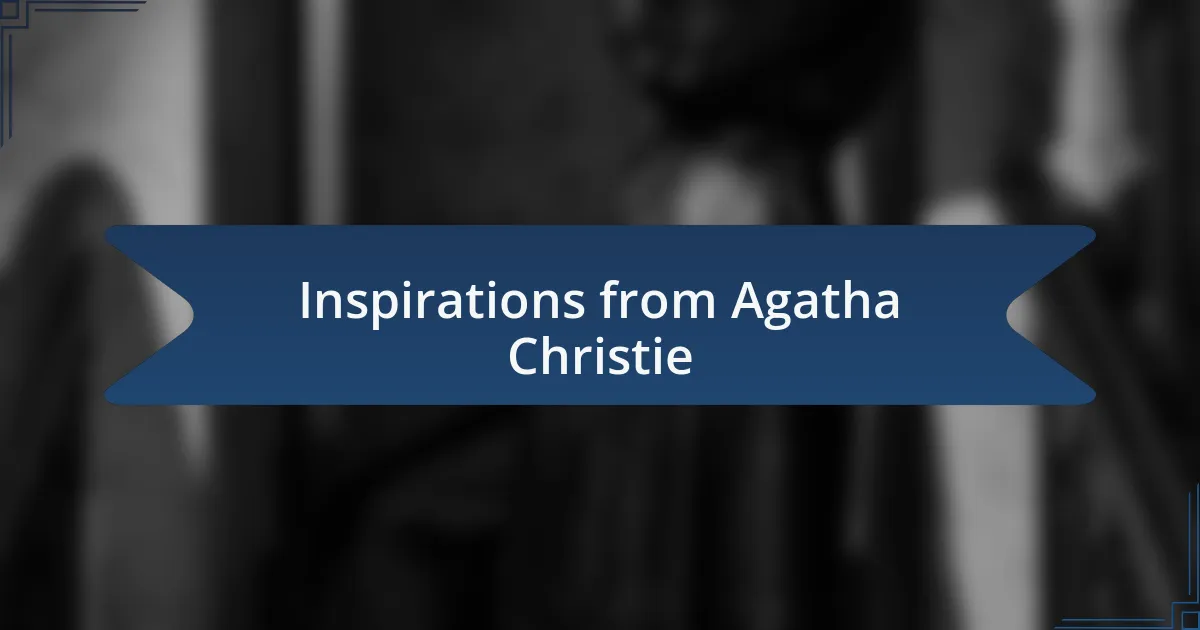
Inspirations from Agatha Christie
Reflecting on Agatha Christie’s influence, I admire how her characters often come to life with distinct voices, each so unique that they almost speak to me personally. I remember my first encounter with Hercule Poirot; his meticulous nature and charming idiosyncrasies inspired me to develop characters who have their own quirks and mannerisms. How often do we overlook the richness that character voice can bring to a story?
Reading Christie’s works made me realize the power of subtlety in writing. Her ability to drop hints without revealing too much taught me that sometimes, less is more. I find myself asking if my writing leaves enough clues for readers to piece together the story on their own. This delicate balance not only respects the readers’ intelligence but also invites them to become active participants in the narrative.
Furthermore, Christie’s masterful plot twists inspire me to cultivate intricate storylines that keep readers on their toes. It’s exhilarating to lead readers down a path, only to flip their expectations in the final pages. In my own writing, I strive to create that sense of surprise and engagement, asking myself how I can challenge my audience just as Christie did. Do you ever wonder how a clever twist can elevate a simple story into something extraordinary?
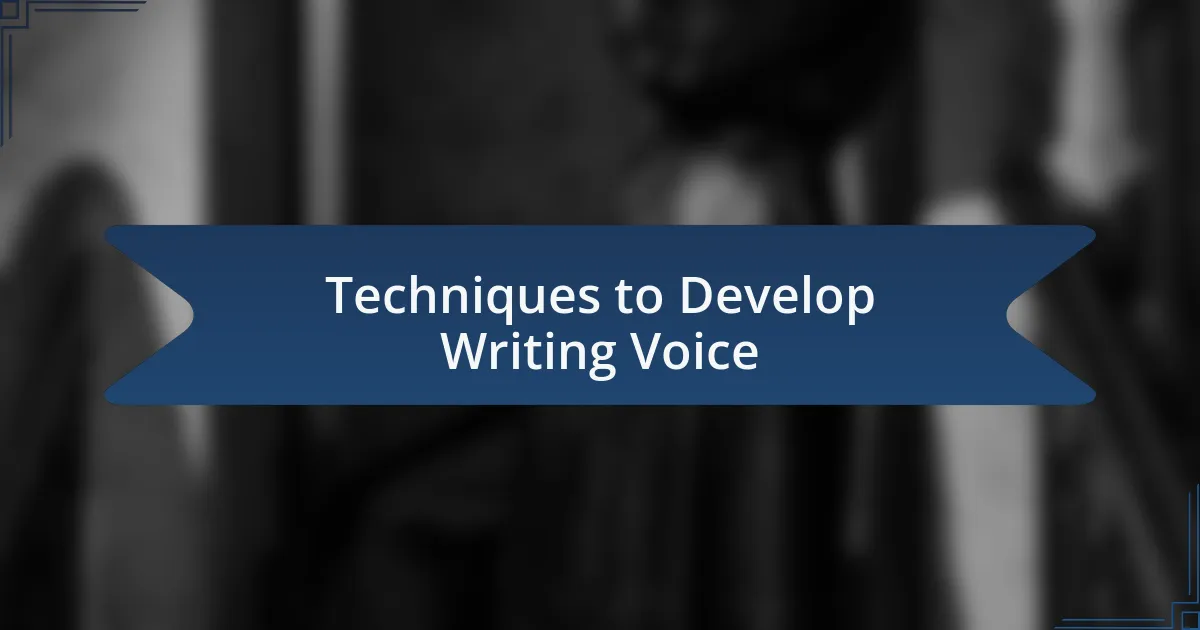
Techniques to Develop Writing Voice
Finding your unique writing voice can be a transformative journey. I remember sitting down on a rainy afternoon, flipping through the pages of my favorite novels, and making notes on how different authors portrayed their characters. I realized that experimenting with different writing styles, from dialogue-heavy scenes to introspective narratives, not only revealed aspects of my voice but also taught me about the flexibility of storytelling. What if you tried shifting styles in your drafts for a fresh perspective?
Another technique that worked wonders for me was journaling. I’d write daily reflections, unfettered by structure, allowing my thoughts to flow freely. This practice helped me uncover the rhythm and tone that felt genuine to me. I discovered that my voice emerged naturally when I stopped trying to sound like someone else and instead focused on expressing my true self. Have you ever noticed how your writing changes when you write from the heart?
Reading aloud has also been a game-changer in refining my voice. Hearing my words come to life made me aware of the nuances of rhythm and inflection in my writing. I often pause to ask myself how each sentence makes me feel and whether it captures the essence of my thoughts. Could voice truly be found in the cadence of our words? I’ve found that it can; it’s about letting your personality shine through every phrase.
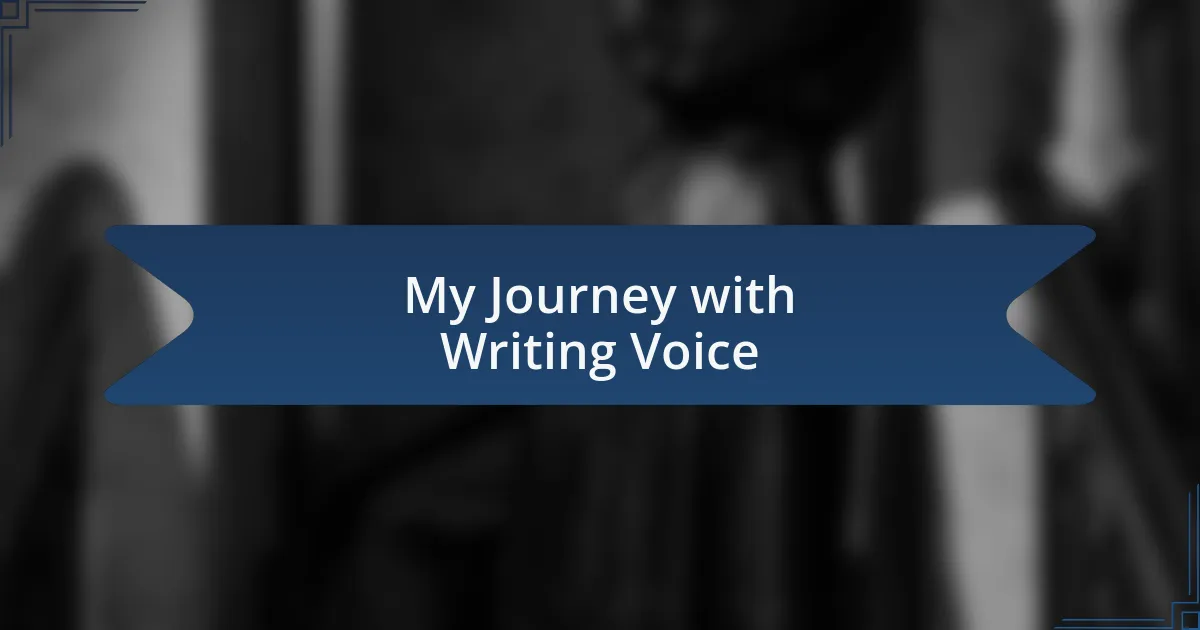
My Journey with Writing Voice
My journey toward developing my unique writing voice wasn’t a straight path; it was full of twists and turns. I distinctly remember a moment in college, sitting in a bustling café, feeling the energy of the world around me. I spontaneously started jotting down the thoughts that bubbled up from observing people’s interactions. That day, I learned how my environment could shape my voice, each word influenced by the hustle and bustle of life around me. Have you ever noticed how a lively setting can spark creativity?
As I dove deeper into writing, I faced moments of doubt. There were times when I would read my drafts and think, “This feels generic.” One pivotal experience was during a writing workshop where we shared pieces for feedback. When others resonated with my personal stories, it hit me hard: authenticity was key. I realized that embracing my quirks and imperfections made my voice stand out. Isn’t it liberating to think that our unique experiences can shape our art?
Over time, I began to appreciate the power of vulnerability in writing. I remember crafting a piece about a challenging period in my life, pouring my emotions onto the page. The rawness of that moment allowed my voice to emerge stronger and more distinct. Afterward, I wondered—could our most difficult experiences be the wellspring of our creative expression? In my case, they certainly were, pushing me to find a voice that genuinely reflects who I am.
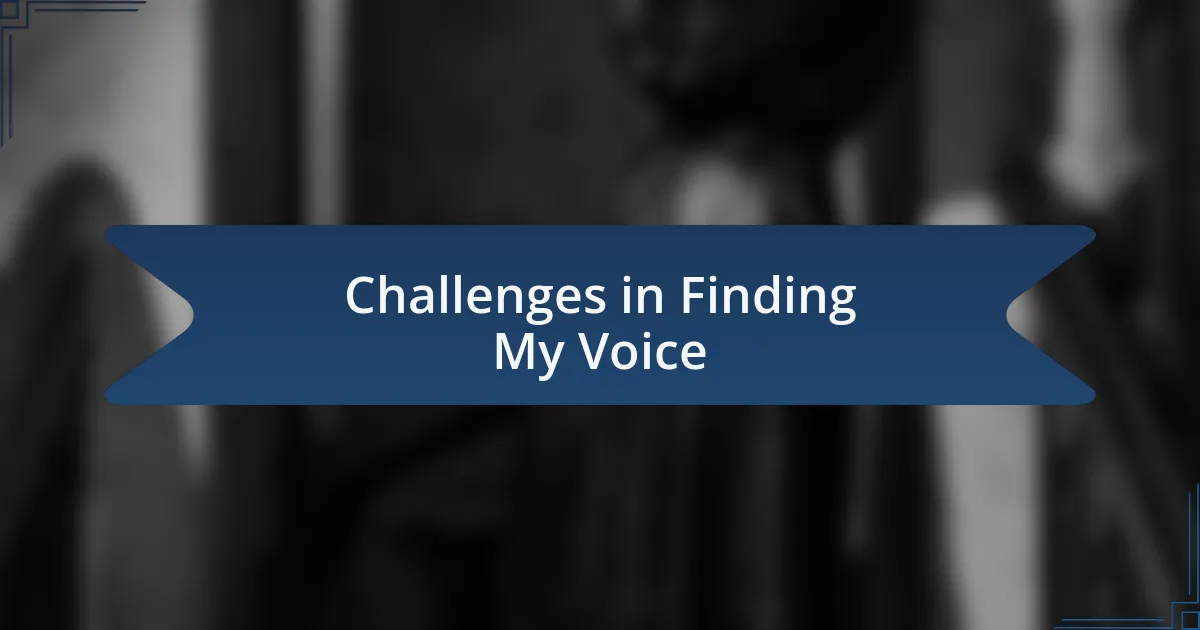
Challenges in Finding My Voice
Finding my writing voice was riddled with challenges that often left me questioning my abilities and direction. I recall staring at a blank page, feeling paralyzed by the need to conform to the expectations of others—professors, peers, and even my own inner critic. It was disheartening to think that what I longed to express could be stifled by fear; has anyone else felt that struggle between authenticity and expectation?
There were moments where I imitated the styles of authors I admired, hoping to sound as poetic or engaging. This mimicry, while a useful exercise, left me feeling hollow. One particularly frustrating afternoon, I tried to emulate Agatha Christie’s intricate plots. I crafted characters that mirrored her brilliance but felt disconnected from my own voice, recognizing that true creativity thrives not by imitation but by genuine expression. Have you ever found yourself caught in the web of comparison?
The breakthrough came when I decided to write solely for myself without regard for judgment. I ventured into journaling, letting my thoughts pour out freely. In one entry, I explored my deepest fears and dreams, where the act of writing became a cathartic experience. This raw honesty revealed a voice I hadn’t realized was there, and I knew then that embracing my vulnerabilities was the key to authenticity. Is it possible that by allowing ourselves that freedom, we can unearth the true essence of who we are?
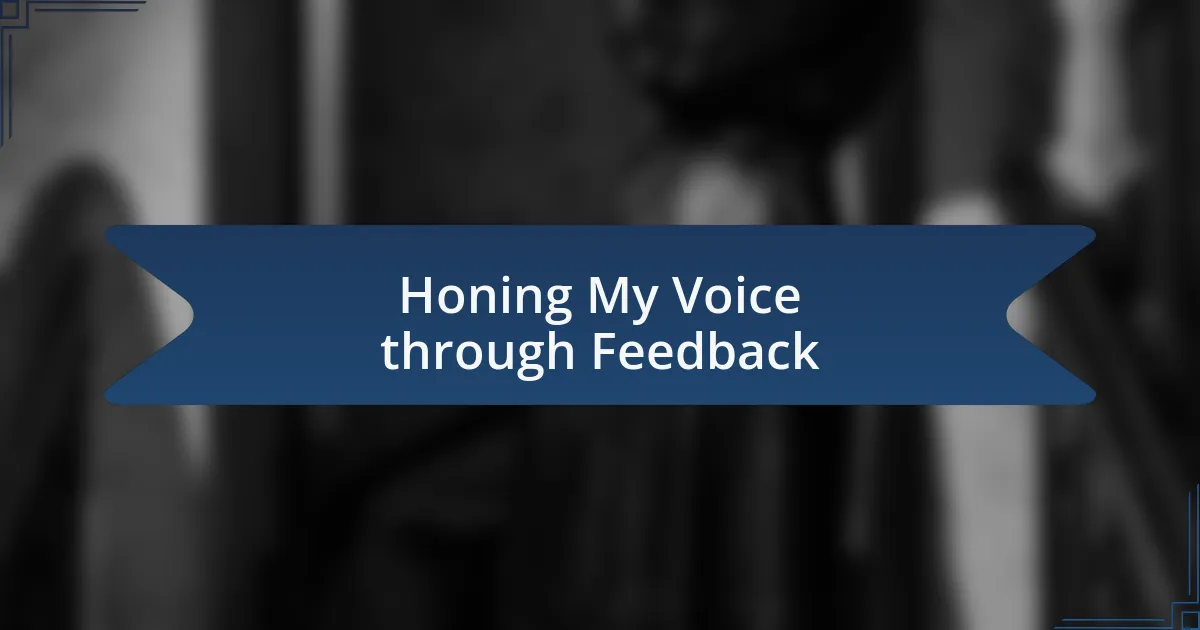
Honing My Voice through Feedback
Receiving feedback was a pivotal moment in my journey to refine my writing voice. Early on, I shared my personal essays with a writing group, exposing my raw thoughts to their scrutiny. Surprisingly, it was the constructive criticism, not the praise, that felt most enlightening; it pushed me to examine what resonated with readers and what didn’t. Have you ever felt that pang of vulnerability when opening your work to others?
One comment still stays with me today. A fellow writer noted that my pieces lacked warmth and personality—something I hadn’t recognized in my own writing. That realization hit hard. I began to reflect on my word choices and how they conveyed my unique perspective. Did I truly want to connect with my audience, or was I trapped in a loop of safe phrasing? I knew I had to dig deeper.
As I continued to iterate on my work, I embraced feedback not just as criticism but as a guide to my evolution. Over time, the blend of insights from various readers shaped my voice into something more authentic and resonant. I learned that my voice isn’t static; it grows and adapts with every conversation, comment, and critique. Isn’t it fascinating how external perspectives can bring clarity to our own thoughts?